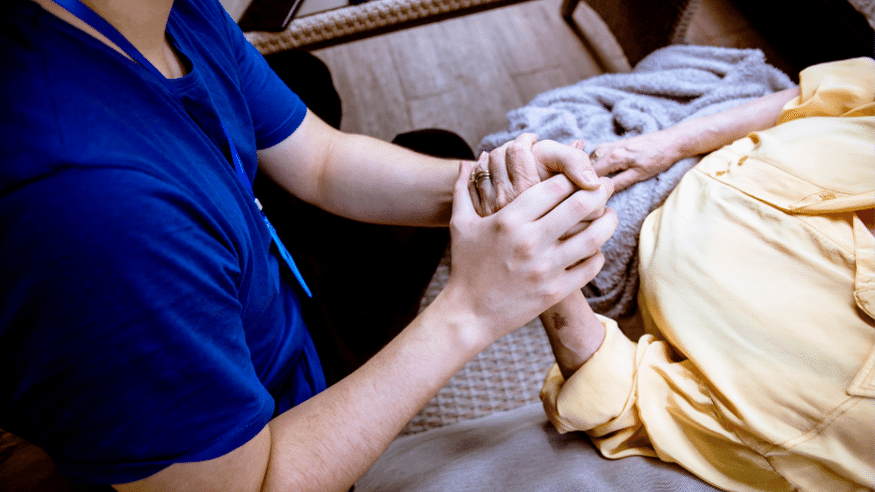Taking care of the ill is rewarding in Islam. Caring for sick people is a truly fulfilling and satisfying experience. It does more than only help others; it also helps us recognize how we might improve someone’s life. Giving comfort, support, and care to needy people brings us incredible joy and satisfaction in our own lives. Additionally, giving care helps us grow personally, develop empathy, and form deep connections. It is a profoundly enriching and rewarding journey for the caregiver and the person cared for.
Taking Care of the Ill in Islam
Narrated Abu Musa:
“The Prophet (ﷺ) said, “Free the captives, feed the hungry, and pay a visit to the sick.”[1]
Islam, a religion of compassion, puts a huge emphasis on the community’s welfare. Taking care of the ill is one of the most rewarding acts in Islam. It is an act of selflessness and kindness that benefits the sick person and holds tremendous rewards for the caregiver. In this blog, we delve into the teachings of Islam and explore how taking care of the ill is a duty and a deeply rewarding act. Thuwair [Ibn Abi Fakhitah] narrated that:
His father said: “Ali took me by the hand and said: ‘Come with us to pay a visit to Al-Hasan.’ So we found that Abu Musa was with him.’ Ali – peace be upon him – said: ‘O Abu Musa! Did you come to visit (the sick) or merely (stop by to) visit?’ He said: ‘No, to visit (the sick).’ So Ali said: ‘I heard the Messenger of Allah saying: “No Muslim visits (the sick) Muslims in the morning, except that seventy-thousand angels, sent Salat upon him until the evening, and he does not visit at night except that seventy thousand angels sent Salat upon him until the morning, and there will be a garden for him in Paradise.” [2]
Significance of Compassion and Mercy in Islam
Compassion and mercy are highly regarded values in Islam. Muslims are encouraged to display kindness and empathy towards all living creatures, particularly those who are experiencing illnesses or ailments. The Prophet Muhammad (peace be upon him) exemplified this, as he consistently demonstrated the utmost care and concern toward the sick. Narrated Abdullah ibn Amr ibn al-’As:
“The Prophet (ﷺ) said: The Compassionate one has mercy on those who are merciful. If you show mercy to those who are on the earth, He who is in heaven will show mercy to you.” [3]
This profound Hadith highlights the reciprocal nature of mercy. It encourages Muslims to embody compassion in their interactions, especially when attending to the needs of the ill.
In the Holy Quran it is guided for us to show compassion:
ثُمَّ كَانَ مِنَ ٱلَّذِينَ ءَامَنُوا۟ وَتَوَاصَوْا۟ بِٱلصَّبْرِ وَتَوَاصَوْا۟ بِٱلْمَرْحَمَةِ
“And—above all—to be one of those who have faith and urge each other to perseverance and urge each other to compassion.” [4]
(Surah Al-Balad, 90:17)
The Reward of visiting and taking care of ill
It’s truly remarkable that as Muslims, we have been entrusted with the noble responsibility of caring for the sick. Visiting the sick is the sacred duty of every Muslim and opens the doors of rewards for Muslims. Furthermore, it plays its part in achieving the true soul of brotherhood. Thauban, the freed slave of Allah’s Messenger (ﷺ), reported Allah’s Messenger (ﷺ) as saying:
“He who visits the sick is supposed to remain in the fruit garden of Paradise. It was said: Allah’s Messenger, what is this Khurfat-ul-Jannah? He said: It is a place abounding in fruits.”[5]
Fulfilling the Rights of Sick
It is very satisfying that Islam has given rights to sick people. It is a due right of the sick Muslim that he should be treated with care and empathy by other Muslims. By caring for the ill, Muslims fulfill this important obligation and earn the pleasure of Allah. Narrated Abu Huraira:
I heard Allah’s Messenger (ﷺ) saying, “The rights of a Muslim on the other Muslims are five: to respond to the salaam, visit the sick, follow the funeral processions, accept an invitation, and reply to those who sneeze. [6]
The importance of visiting the sick can be determined from the instance when the Holy prophet (peace and blessings be upon him) went to see an old woman. She was the woman who used to throw garbage at him on his way to the mosque. He (peace and blessings be upon him) never ever reacted to her atrocity and remained patient with her maltreatment.
One day, to his surprise, no rubbish fell on him. He went to the woman’s house and found her weak and scared in bed. Instead of scolding or punishing her, Prophet Muhammad (peace and blessing be upon him) reassured and cleaned her house, ensuring her comfort. Touched by his kindness, the older woman decided never to disrespect him again. This story emphasizes the significance of caring for the ill, even in the face of hostility, and how compassion can transform hearts.
The Virtue of Helping Other Muslims
It was narrated that Abu Hurairah said:
“The Messenger of Allah said: ‘Whoever relieves a Muslim of some worldly distress, Allah will relieve him of some of the distress of the Day of Resurrection, and whoever conceals (the faults of) a Muslim, Allah will conceal him (his faults) in this world and the Day of Resurrection. And whoever relieves the burden from a destitute person, Allah will relieve him in this world and the next. Allah will help His slave so long as His slave helps his brother. Whoever follows a path in pursuit of knowledge, Allah will make easy for him a path to Paradise. [7]
Providing physical and emotional support to ill people embodies this noble act of charity. Islam encourages believers to spend their wealth and time serving others, particularly those in need, fostering communal harmony and love.
This collaborative effort fosters the development of strong personal relationships. These connections can profoundly impact our lives, enriching our social network and providing a strong support system in times of need.
Strengthening the Bonds of Brotherhood
Islam places a strong emphasis on fostering unity and brotherhood among its followers. Taking care of the ill allows Muslims to develop deep bonds with one another, boosting the friendliness of their communities. It was narrated from Abu Sa’eed Al-Khudri that the Messenger of Allah (ﷺ) said:
“When you enter upon one who is sick, cheer him up and give him hope of a long life, for that does not change anything (of the Divine Decree), but it will cheer the heart of the one who is sick.” [8]
Conclusion
Taking care of the ill is a virtuous and rewarding act in Islam. It symbolizes the principles of compassion, mercy, and altruism. By fulfilling the rights of others and tending to the needs of the sick, Muslims demonstrate their commitment to the teachings of Islam. This act of kindness benefits the individuals being cared for, fosters unity within the community, and cultivates personal growth. As Muslims strive to embody the teachings of their faith, taking care of the ill remains an essential aspect of fulfilling their religious obligations and seeking the pleasure of Allah.
Taking care of the ill is rewarding and part of an amazing content series. For more, you are encouraged to follow our whole series, Time to Revive, where we discuss the forgotten Sunnah or Prophet Muhammad, Peace be Upon Him, and try to revive them by considering most of the perspectives of the modern world. Reading them and making them a habit is now your choice.
By Joweria Shahid
References
- Sahih al-Bukhari 3046: Book 56, Hadith 252
- Jami` at-Tirmidhi 969: Book 10, Hadith 5
- Sunan Abi Dawud 4941: Book 43, Hadith 169
- Al-Quran (Surah Al-Balad, 90:17)
- Sahih Muslim 2568d: Book 45, Hadith 52
- Sahih al-Bukhari 1240: Book 23, Hadith 4
- Sunan Ibn Majah 225: Introduction, Hadith 225
- Sunan Ibn Majah 1438 : Book 6, Hadith 6




